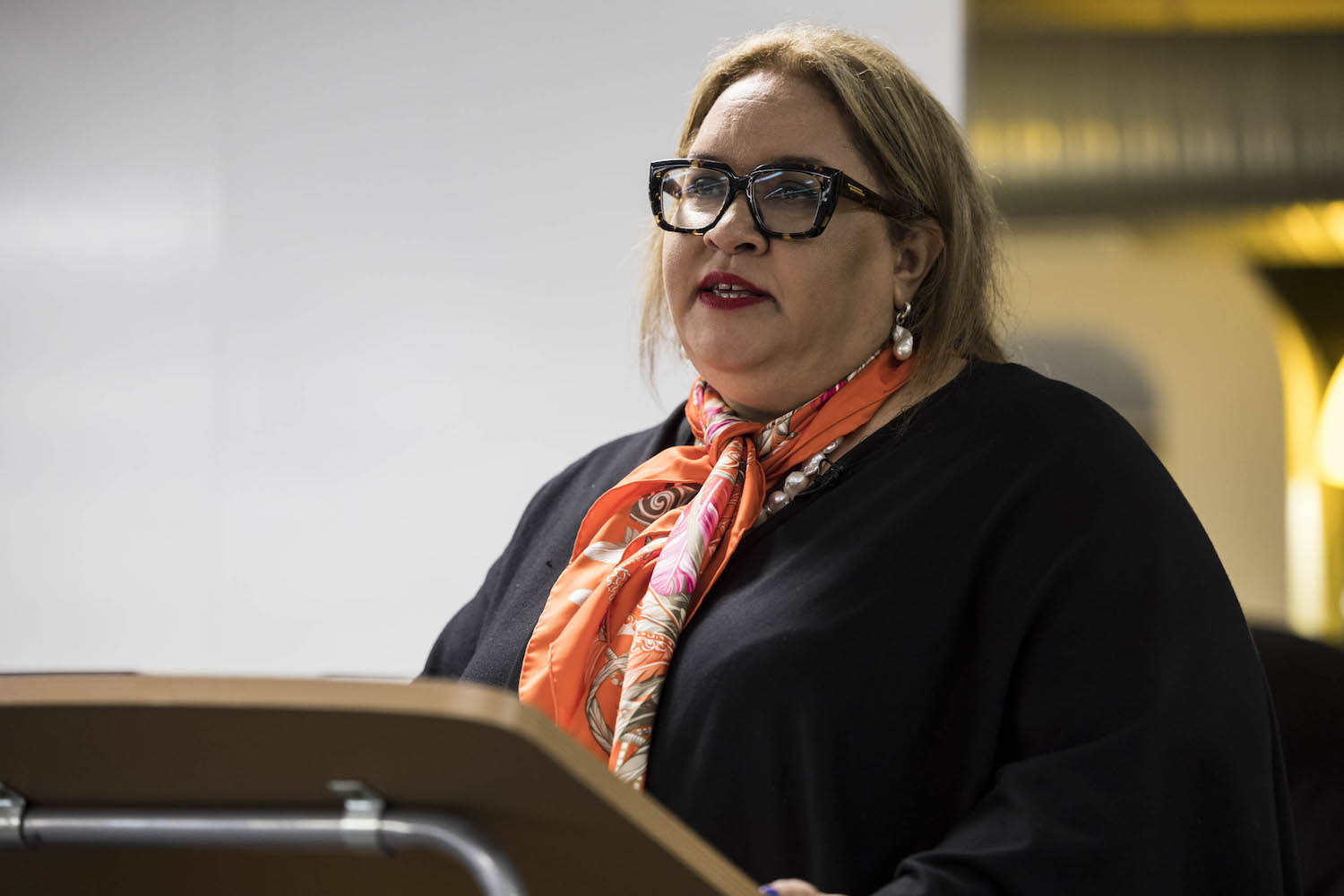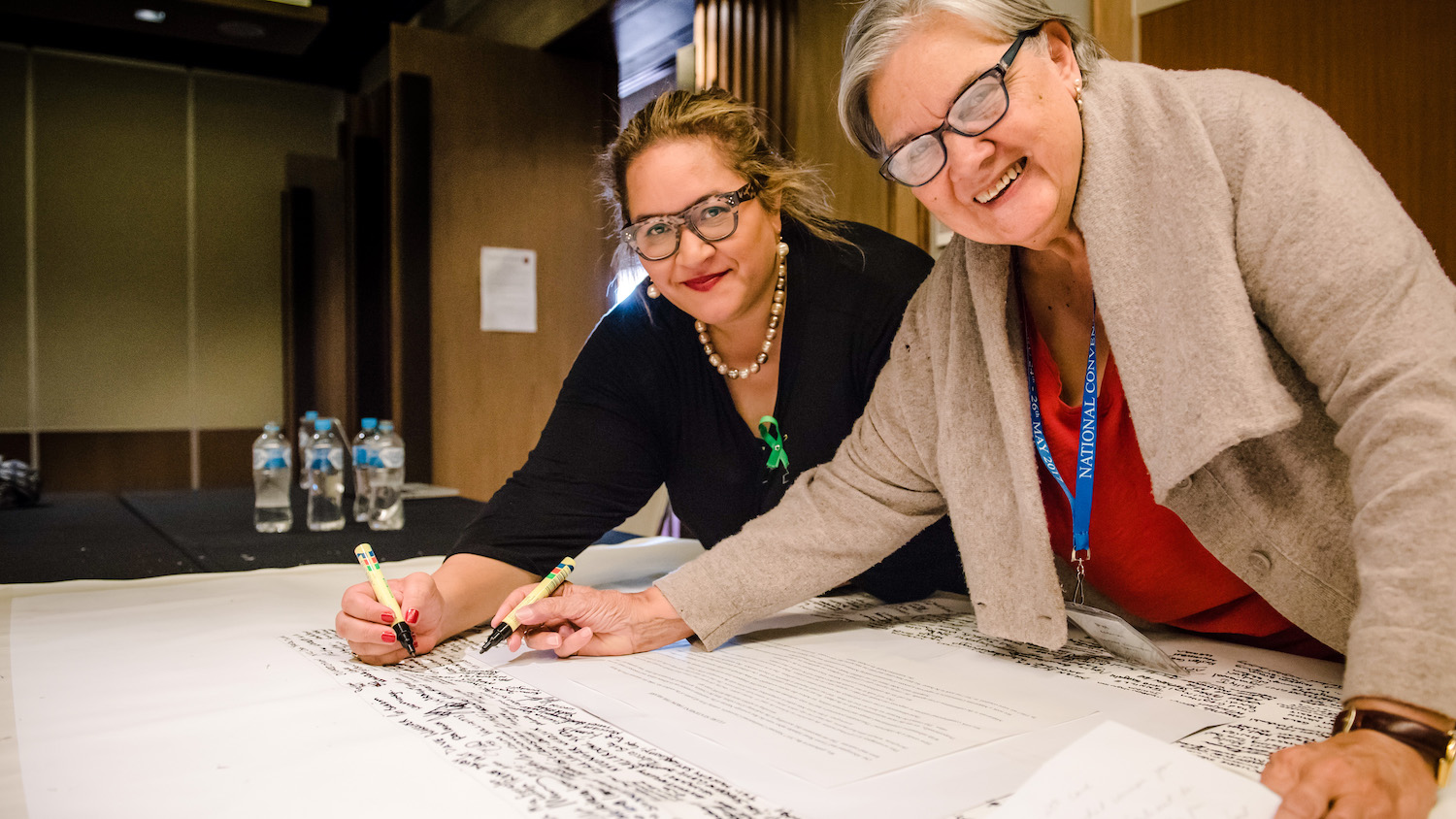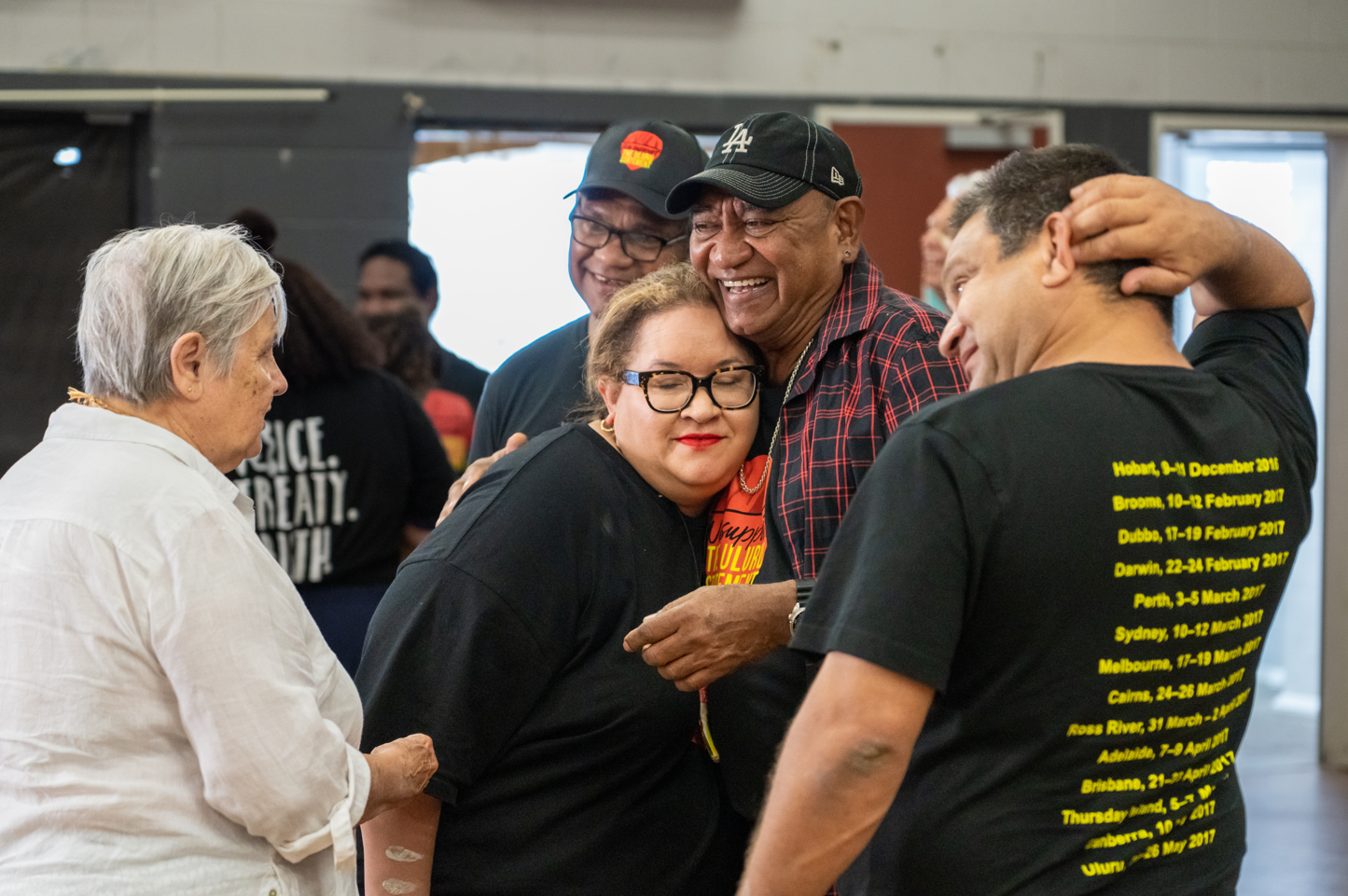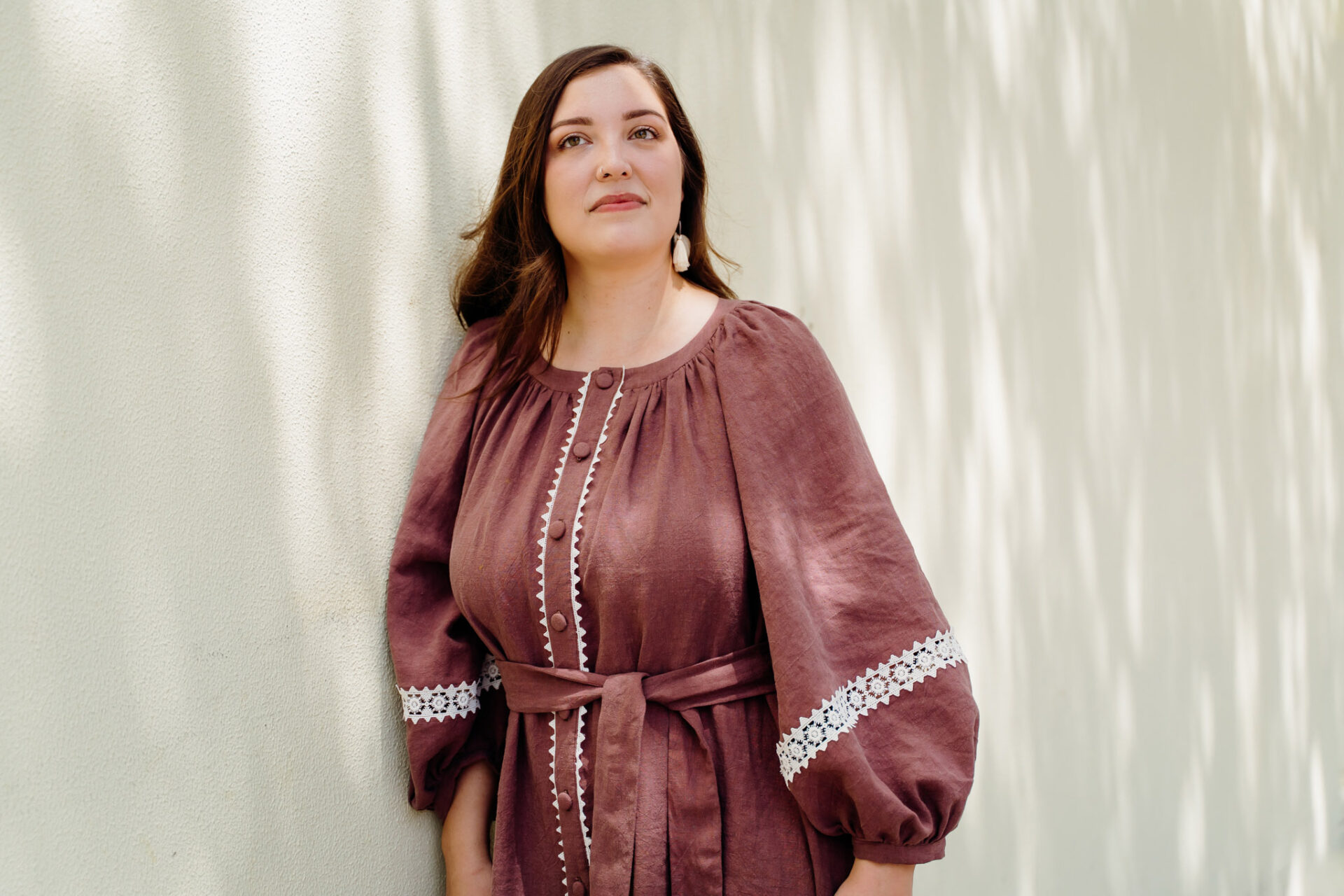“The Story of Australia is the Story of All of Us”: Why the Uluṟu Statement from the Heart Matters

- Words by Peppermint
top image PROFESSOR DAVIS DELIVERS THE ULURU STATEMENT FROM THE HEART.
The Uluṟu Statement from the Heart, released in 2017, is the largest consensus of First Nations peoples on a proposal for substantive recognition in Australian history. Australia is one of the only Commonwealths in the world without a treaty with its Indigenous peoples. It calls for a “First Nations Voice” in the Australian Constitution and a Makarrata Commission (Makarrata is a Yolngu word that loosely describes a process of conflict resolution and peacemaking) to supervise agreement-making and truth-telling between the Australian government and Aboriginal and Torres Strait Islander peoples, collectively referred to as Voice, Treaty, Truth.
In a symbolic step, Anthony Albanese endorsed the Uluṟu Statement during his 2022 election victory and committed to holding a referendum on changing the constitution of Australia to improve the representation of First Nations peoples.
Here, constitutional lawyer Professor Megan Davis, co-chair of the Uluṟu Dialogue, member of the Referendum Council and globally recognised expert on Indigenous peoples’ rights, shares some insight into the journey so far, what changes a referendum may make and why the Uluṟu Statement matters to all of Australia.

Tell us a bit about your personal background, your work and what led you to working on the Uluṟu Dialogue…
As a Cobble Cobble woman, I’ve always been passionate about advocating for a voice for my people, for First Nations people. I always wanted to be a lawyer – ever since around Grade Six. I’ve spent my whole working life as a constitutional lawyer and my work developing the Uluṟu Statement is an extension of that goal. The Uluṟu Statement campaign and my role as co-chair of the Uluṟu Dialogue, is an opportunity to give back to my community and create a better future for all Australians.
About ten years ago, I started getting selected by the government and opposition to expert panels like the Uluṟu Statement’s Referendum Council. As you can see, things really took off from there.
These days, in addition to the statement, I continue my legal advocacy for the rights of First Nations peoples – I’m expert member and Chair of the United Nations Expert Mechanism on the rights of Indigenous Peoples, based in Geneva, and formerly served on the United Nations Permanent Forum on Indigenous Issues, based in New York. I’m also the Pro Vice-Chancellor Society at the University of New South Wales (UNSW) and the Balnaves Chair in Constitutional Law. I’ve been a commissioner on the NSW Land and Environment Court for over a decade, assisting the court judiciary on Aboriginal land rights matters, and I’m a director on the Australian Rugby League Commission.
What’s the state of play so far with the statement?
The Uluṟu Statement from the Heart is a culmination of decades of advocacy for structural change through constitutional recognition of First Nations. It is a common way that democracies globally accommodate Indigenous rights within the framework of the state. It has really been a long time coming. This year we’ve been talking about the Uluṟu Statement marking its fifth anniversary since it was presented to the Australian people.
As early as the 1920s, there have been grassroots calls for a First Nations Voice.
I’d say the recent history of the Uluṟu Statement really started with the expert panel on Indigenous constitutional recognition set up by former prime minister Julia Gillard. When she was negotiating for the balance of power in the lower house after the hung Parliament in 2010, the Greens and the two independents Tony Windsor and Rob Oakeshott asked her to move on the multiparty support for constitutional recognition. Then in 2015, the Referendum Council that was established by then-prime minister Malcolm Turnbull and former opposition leader Bill Shorten led to the Uluṟu Statement.
After that, we underwent two years of First Nations Regional Dialogues where local communities had their say in discussing options for constitutional reform. These dialogues led to the development of the Uluṟu Statement from the Heart.
Now, five years on, we have a Prime Minister in Anthony Albanese who has committed to implementing the Uluṟu Statement in full. What’s next is a referendum to the Australian people, which Albanese has committed to in his first term.

image MEGAN DAVIS AND PAT ANDERSON AO SIGNING THE ULURU STATEMENT.
What does it represent for First Nations peoples around Australia?
The Uluṟu Statement represents an opportunity to empower our people by recognising their voice. It is a very simple ask: that we be included in discussions about law and policies that impact our lives.
Rather than a log of claims to government, the group gathered at Uluṟu decided that the Uluṟu Statement from the Heart is a bridge builder, a sign of friendship – a statement that comes from the heart of First Nations peoples in Australia, as an invitation for all Australians to walk with us into a better future.
We want to work together with the Australian public to build a nation we can all be proud of; a nation that celebrates our diverse cultural and linguistic backgrounds, our rich histories and the value that we all bring to the fabric of our society.
Why is it so important to all of Australia and why is it something that non-Indigenous Australians should care about?
The story of Australia is the story of all of us – it makes no sense to only tell one part of it.
The Uluṟu Statement is not about rewriting history – it’s about giving First Nations people a seat at the table to have a say in the laws that affect us. We are the only cultural group who has laws made about us… It’s only right we have a voice on these matters.
And this matters to most Australians because everywhere they move on this continent they are walking over footprints of the ancient polities who have resided here for well over 60,000 years. Since the 2020 lockdown more and more Australians have come to learn which First Nation’s country they reside on. Even Australia Post allows for Australians to write this on the address panel of parcels and letters. Recognition of a Voice is a sign of respect.
Can you explain the significance of a referendum on this issue and what it will change?
The Australian Constitution can only be changed by referendum. This means all Australians have a say in when it is altered. A referendum is a special vote at a ballot box. It requires a majority of states to vote “Yes” and a national majority.
The constitutional recognition journey has been underway in Australia for 11 years. It wasn’t until the Uluṟu Statement that Australians heard from First Nations as to what recognition might look like. Prior to that the Australian Government had only taken advice from experts and politicians.
First Nations peoples have been fighting for a space in democratic life for generations, and to this day, we still have no say in the laws and policies that affect us. Now, we have the opportunity to change the course of history and create better outcomes for our communities and all of Australia.
The referendum will put the empowerment of our people in the hands of all Australians. I trust that the nation will make the right choice. It will signify a new chapter for Australia, and a new chapter in the enduring history of our First Nations peoples.
As for substantive change: we know from empirical evidence across the world, if Indigenous peoples are involved in the development of laws and policies that impact only them, the quality of those laws and policies will be vastly enhanced. Almost two decades of Closing the Gap with very little progress tells us that government and bureaucrats cannot make a difference to communities’ lives if we are not consulted.
History is calling for acknowledgement… We want the Australian people to answer through the referendum.

Australia’s new Prime Minister committed to the Statement in his election victory speech. Do you believe the recent change in government represents a shift in the mood for issues of reconciliation and First Nations sovereignty?
Absolutely it does. For many years, politicians and our government in power have ignored our calls for a Voice to Parliament.
The leadership of Prime Minister Albanese does mark a shift in that. The tide is turning, and the Australian public is becoming more aware of the historical context within which we all live.
It’s refreshing and exciting to have a Prime Minister who has read all the material carefully and closely and openly acknowledges and endorses the statement. It’s significant progress, and it represents a change in the way our country is working.
After decades of talk, the time has finally come to take action. We’re looking forward to working with Prime Minister Albanese on the Voice.
What do you hope that the Uluṟu Dialogue and Statement will mean for future Australians?
I hope that it will mean a new chapter for all of us. We’ve come a long way in this journey towards an equitable future for all Australians – but there’s still a way to go.
I envision a future where all Australians are respected and celebrated, where our shared histories are acknowledged, and where our voices are given equal weight in our parliament.
But most importantly, I hope the statement represents a future and nation we can all be proud of.
images SUPPLIED.
JOIN OUR MAILING LIST
Brighten up your inbox with our not-too-frequent emails featuring Peppermint-related news, events, competitions and more!
explore
More articles
Look, I don’t want to make anyone panic but IT’S DECEMBER!!! If you’re planning to give homemade gifts, you’re going to have to act fast. …
Hang out with us on Instagram
“In the 1940’s, Norwegians made and wore red pointed hats with a tassel as a form of visual protest against Nazi occupation of their country. Within two years, the Nazis made these protest hats illegal and punishable by law to wear, make, or distribute. As purveyors of traditional craft, we felt it appropriate to revisit this design.”
Crafters have often been at the heart of many protest movements, often serving as a powerful means of political expression. @NeedleAndSkein, a yarn store in Minnesota, are helping to mobilise the craftivists of the world with a ‘Melt The Ice’ knitting pattern created by @Yarn_Cult (with a crochet pattern too), as a way of peaceful protest.
The proceeds from the $5 pattern will go to local immigrant aid organisations – or you can donate without buying the pattern.
Raise those needles, folks – art and craft can change the world. 🧶
Link in bio for the pattern.
Images: @Gather_Fiber @NeedleAndSkein @a2ina2 @KyraGiggles Sandi.204 @WhatTracyMakes AllieKnitsAway Auntabwi2
#MeltTheIce #Craftivism #Knitting #CraftForChange

TWO WEEKS TO GO! 🤩
"The most important shift is moving from volume-led buying to value-led curation – choosing fewer, better products with strong ethics, considered production and meaningful stories. Retailers have real influence here: what you buy signals what you stand for. At Life Instyle, this means using the event to discover and invest in small-scale, planet-considerate brands that align with your values and your customer’s conscience. Consumers don’t need more things; they need better things, and retailers play a key role in selecting, contextualising, and championing why those products matter."
Only two more weeks until @Life_Instyle – Australia`s leading boutique retail trade show. If you own a store, don`t miss this event! Connect with designers, source exquisite – and mindful – products, and see firsthand why this is Australia’s go-to trade show for creatives and retailers alike. And it`s free! ✨️
Life Instyle – Sydney/Eora Country
14-17 February 2026
ICC, Darling Harbour
Photos: @Samsette
#LifeInstyle #SustainableShopping #SustainableShop #RetailTradeEvent

Calling all sewists! 📞
Have you made the Peppermint Waratah Wrap Dress yet? Call *1800 I NEED THIS NOW to get making!
This gorgeous green number was modelled (and made) by the fabulous Lisa of @Tricky.Pockets 🙌🏼
If you need a nudge, @ePrintOnline are offering Peppermint sewists a huge 🌟 30% off ALL A0 printing 🌟 when you purchase the Special Release Waratah Wrap Dress pattern – how generous is that?!
Head to the link in bio now 📞
*Not a real number in case that wasn`t clear 😂
#PeppermintWaratahWrapDress #PeppermintPatterns #SewingPattern #WrapDress #WrapDressPattern

8 Things to Know About January 26 - from @ClothingTheGaps:
Before you celebrate, take the time to learn the truth. January 26 is not a day of unity it’s a Day of Mourning and Survival for Aboriginal and Torres Strait Islander peoples.
It marks the beginning of invasion, dispossession, and ongoing colonial violence. It’s time for truth-telling, not whitewashed history.
Stand in solidarity. Learn. Reflect. Act.
✊🏽 Blog written by Yorta Yorta woman Taneshia Atkinson.
🔗 Link in bio of @ClothingTheGaps to read the full blog
#ChangeTheDate #InvasionDay #SurvivalDay #AlwaysWasAlwaysWillBe #ClothingTheGaps

As the world careens towards AI seeping into our feeds, finds and even friend-zones, it`s becoming increasingly hard to ignore.
We just wanted to say that here at Peppermint, we are choosing to not print or publish AI-generated art, photos, words, videos or content.
Merriam-Webster’s human editors chose `slop` as the 2025 Word of the Year – they define it as “digital content of low quality that is produced usually in quantity by means of artificial intelligence.” The problem is, as AI increases in quality, it`s becoming more and more difficult to ascertain what`s real and what`s not.
Let`s be clear here, AI absolutely has its place in science, in climate modelling, in medical breakthroughs, in many places... but not in replacing the work of artists, writers and creatives.
Can we guarantee that everything we publish is AI-free? Honestly, not really. We know we are not using it to create content, but we are also relying on the artists, makers and contributors we work with, as well as our advertisers, to supply imagery, artwork or words created by humans. AI features are also creeping into programs and apps too, making it difficult to navigate. But we will do our best to avoid it and make a stand for the artists and creatives who have had their work stolen and used to train AI machines, and those who are now losing work as they are replaced by this energy-sapping, environment-destroying magic wand.
Could using it help our productivity and bottom line? Sure. And as a small business in a difficult landscape, that`s a hard one to turn down. We know other publishers who use AI to write stories, create recipes, produce photo shoots... but this one is important to us.
`Touch grass` was also a Merriam-Webster Word of the Year. We`ll happily stick with that as a theme, thanks very much. 🌿

If your fingers are twitching for some crafting, take a peep at this massive list of marvellous makes that can be whipped up in a flash, put together by our Sewing Manager Laura. Ok yes, it was originally a roundup we created for easy Christmas gifts, but now it can be your blueprint for easy craft wins to go on your 2026 making must-do list!
If money and time are slim for you right now – as they are for many of us – these 22 projects will help you avoid the chaos and consumerism of the malls, scratch that creative itch and produce a fun me-made make that won’t break the bank.
Link in bio! 🪡🎨✂️
#PeppermintMagazine #MeMadeGifts #DIYs #EasyWins

















